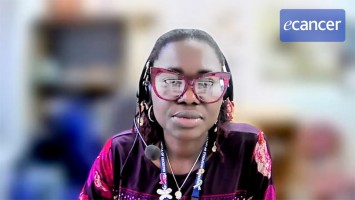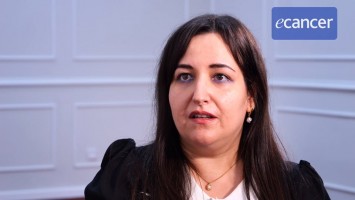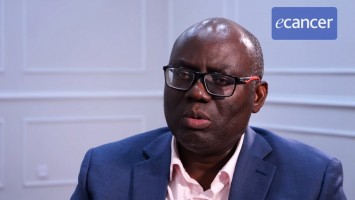Dear friends and colleagues, I have the honour and pleasure to present to you the manifesto that, on behalf of the EBCC-12 faculty, was discussed and presented at this recent important breast cancer congress. First of all I would like to present myself: I am Philip Poortmans, radiation oncologist working in Antwerp at the Iridium Network and the University of Antwerp. The work is done jointly through my co-Chair, Fatima Cardoso from Lisbon, Portugal, and the other team members include Fiona MacNeill who is a surgeon, breast cancer surgeon, Frédérique Penault-Llorca, a pathologist from France, Alexandru Eniu who is a medical oncologist, Francesco Sardanelli from Italy who is a radiologist and the patient representative, of course very important, Elizabeth Bergsten Nordström from Norway.
The title of the manifesto this year was ‘Why don’t all European breast cancer patients get the most appropriate care?’ How come, because we are a rich region, Europe, but we are not one united place? For example, reimbursement rules in general in medicine but for breast cancer care in particular are not always aligned with evidence-based medicine and clinical practice guidelines. They are, in some occasions, even that poor that they hamper access to treatment, for example outpatient treatment care rather than in-patient or hospitalised care, risk-reducing surgery for BRCA carriers or for radiation therapy, which is my piece of cake, post-operative radiation therapy which can, in general, be given hypofractionated.
What both clinicians and patients ask is not something that is more expensive but we want to have fairer and more appropriate use existing healthcare funding. A change in the reimbursement policies would without any doubt result in more effective, more cost-effective healthcare that’s also better aligned with optimal clinical practice guidelines. The direct involvement of the fully informed patient is crucial to this demand and to achieve the needed changes to adapt the reimbursement rules. This goes for all European, and even outside of Europe, cancer patients because they deserve evidence-based treatment today and this according to high quality guidelines.
In the manifesto which will hopefully soon be published in The European Journal of Cancer we will describe a number of examples. For example, on the radiology, on the imaging part, where it often starts with mass screening, not all European countries have population based screening mammography programmes, there are two examples. Often it exists but not in an organised way. And some of the countries that do have screening programmes, not all age groups are covered and often they use outdated techniques, for example, digital tomosynthesis is not always available for high risk patients, MRI access is not fully available for all patients.
For pathology most countries can offer the proper pathological assessment of breast cancer, however, reimbursement differs from one country to another. We know that quality assurance programmes are essential because there is a lot of variation in how you determine, for example, hormonal receptors or HER2 receptors. Genomic testing, which can give prognostic information and tailor the treatment is not widely available for European cancer patients, breast cancer patients in Europe.
If we go to surgery, the biggest problem is the discrepancy between the real oncological component of the treatment and the hugely important restoration, restorative component, of the treatment. For example, currently in many countries radical surgery is favoured rather than breast reconstruction, complex breast sparing techniques. The confusion between reconstruction, which is an oncological procedure which should be a restorative procedure, and plastic surgery leads often to inappropriate reimbursement rules. Also risk-reducing surgery is not covered in all of the countries.
For radiation oncology which is a cost-effective treatment but rather under-utilised, one of the biggest issues is that a lot of countries pay per fraction. So there is an initiative, an incentive to offer patients prolonged treatment while it’s evidence based that you can treat patients a little bit more dose per day but with less fractions, thereby having the same efficacy and even slightly less side effects and lowering significantly the burden. However, this is often not available because of simple reimbursement and cost issues.
For medical oncology several treatments are much better reimbursed based on an in-hospital system rather than, for example, oral medication or outpatient organisations. Biosimilars is another example, the access is not evenly supported. Again, here the community does not ask for more money, it calls for better spending of the money.
The patient perspective is hugely important and as the patients said, it was an eye-opener. Because often we are focussed on better treatment, to have less toxicity, more efficacy but the currently existing reimbursement rules have a hugely important influence on what we need to do in practice. The same breast cancer patient can be offered different treatments in different countries depending on the reimbursement. So how can we make a change? Patients need to be involved, they need to be taught what is the best evidence-based practice and what is the influence of reimbursement to, together with the clinicians, improve this in the near future.
So, concluding, evidence and clinical practice guidelines are often not offered to all patients because of financial constraints. Reimbursement, reimbursement rules, follow a long process and they often lag behind developments. More effective approaches are not reimbursed or outdated, more protracted, more cumbersome approaches continue to be favourably reimbursed while we can do less invasive and lower the burden to the patients.
It’s about all steps, from screening over diagnosis to treatment and to aftercare and the variation is huge from one country to another but even within countries there can be a variation depending on the system, for example public against private, or different regions within one country and from one profession to another.
But, in summary, all European patients are entitled to high quality evidence-based care, it depends on their personal circumstances and it should be, but it is unfortunately not always the case, independent of the restrictions of reimbursement.
Thank you very much and join us in this effort.








